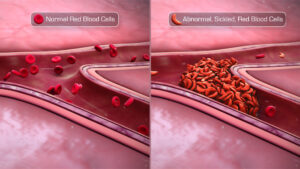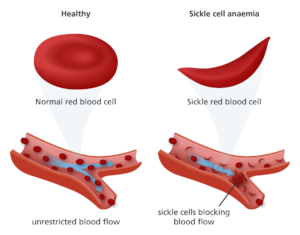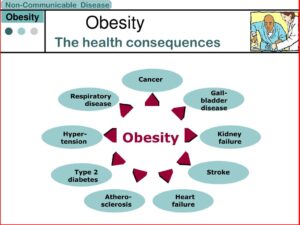Back to: Physical and Health Education JSS 2
Welcome to class!
In today’s class, we shall be talking about the Nature of sickle cell and obesity as non- communicable diseases. Please enjoy the class!
Nature of Sickle Cell and Obesity as Non- communicable Diseases

Welcome, class, to a deep dive into the world of non-communicable diseases (Non-communicable disease)! Today, we’ll be focusing on two formidable foes: sickle cell disease and obesity. Buckle up, because we’re about to dissect their nature, impact, and strategies for living well with these conditions.
Sickle Cell Disease: A Cellular Odyssey Gone Wrong
Imagine your red blood cells, usually plump and flexible, morphing into rigid, crescent-shaped warriors. This, my friends, is the essence of sickle cell disease. A genetic mutation alters hemoglobin, the protein that carries oxygen, leading to these misshapen cells.
These spiky soldiers wreak havoc in our vascular system. They get stuck in tiny capillaries, causing blockages that restrict blood flow and oxygen delivery. This painful saga unfolds in various organs, leading to a cascade of symptoms like:

- Vaso-occlusive crises: excruciating pain episodes in bones, joints, and muscles.
- Anemia: fatigue and weakness due to low red blood cell count.
- Frequent infections: impaired immune function due to chronic inflammation.
- Organ damage: long-term complications affecting lungs, kidneys, and heart.
Living with Sickle Cell: From Warriors to Survivors
While sickle cell throws a tough punch, it doesn’t have to define you. Here’s how warriors with sickle cell can thrive:
- Early diagnosis and treatment: Newborn screening and prompt interventions like blood transfusions and hydroxyurea medication can significantly improve outcomes.
- Pain management: a multi-pronged approach with medications, physical therapy, and psychological support can ease the sting of pain crises.
- Infection prevention: vaccinations, good hygiene, and prompt treatment of infections are crucial to stay healthy.
- Healthy lifestyle: a balanced diet, regular exercise, and adequate sleep empower the body to cope better.
- Social support: connecting with other sickle cell warriors and support groups fosters resilience and hope.
Obesity:

Now, let’s shift gears to obesity, a condition where excess body fat impairs health. It’s not just about looking a certain way; it’s a complex interplay of lifestyle factors and our body’s metabolism.
Causes of Obesity:
- Unhealthy diet: excessive intake of processed foods, sugary drinks, and unhealthy fats coupled with low intake of fruits, vegetables, and whole grains.
- Physical inactivity: a sedentary lifestyle with minimal exercise burns fewer calories, leading to fat accumulation.
- Genetic predisposition: some individuals have genes that make them more susceptible to weight gain under certain environmental conditions.
- Hormonal imbalances: hormonal dysregulation due to conditions like hypothyroidism or polycystic ovary syndrome can influence weight gain.
Health Consequences of Obesity:
Obesity increases the risk of various Non-communicable disease, including:
Cardiovascular diseases: heart attack, stroke, and high blood pressure.
Type 2 diabetes: impaired insulin function and high blood sugar levels.
Certain cancers: breast, colon, and endometrial cancers.
Musculoskeletal disorders: osteoarthritis, joint pain, and mobility issues.
Mental health conditions: depression, anxiety, and low self-esteem.
Conquering Obesity
Remember, obesity is a chronic condition, but it’s manageable. Here are some strategies for progress:
Healthy eating: focus on whole grains, fruits, vegetables, lean protein, and healthy fats. Reduce processed foods, sugary drinks, and unhealthy fats.
Regular physical activity: aim for at least 150 minutes of moderate-intensity exercise per week or 75 minutes of vigorous-intensity exercise. Find activities you enjoy and make them part of your routine.
Behavioral changes: address emotional eating, portion control, and sedentary habits.
Seeking support: consult healthcare professionals like doctors, registered dietitians, and therapists for personalized guidance and support.
Remember: Both sickle cell and obesity are complex Non-communicable disease, but with proper knowledge, management strategies, and support, individuals can live healthy and fulfilling lives. Let’s move forward with empathy, understanding, and a commitment to empowering ourselves and others to conquer these chronic giants.
We have come to the end of today’s class. I hope you enjoyed the class!
In the next class, we shall be discussing Nature of asthma, anemia and kwashiorkor as Non-communicable diseases.
In case you require further assistance or have any questions, feel free to ask in the comment section below, and trust us to respond as soon as possible. Cheers!
Question Time:
Section A: Objective Tests
- Define the term “non-communicable disease”. (2 marks)
- Identify three main ways in which sickle cell disease is diagnosed. (3 marks)
- Which of the following describes the shape of red blood cells in sickle cell disease? (a) Elongated (b) Spherical (c) Crescent-shaped (d) Disc-shaped (1 mark)
- State two main complications of obesity. (2 marks)
- Explain how genetic factors can contribute to obesity development. (3 marks)
- List four lifestyle modifications that can help manage obesity. (4 marks)
- Match the following terms with their correct definitions: (a) Vaso-occlusive crisis (b) Hemoglobin (c) Insulin resistance (d) Body mass index (BMI) (i) A measure of body fat relative to height and weight. (ii) Difficulty in blood flow due to sickle-shaped cells. (iii) Protein responsible for oxygen transport in red blood cells. (iv) Decreased ability of cells to respond to insulin, leading to high blood sugar. (4 marks)
- Briefly describe the role of early diagnosis and treatment in managing sickle cell disease. (3 marks)
- Explain how physical activity can aid in weight management for individuals with obesity. (4 marks)
- Discuss one social or ethical challenge associated with either sickle cell disease or obesity. (4 marks)
